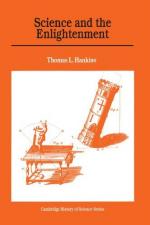
|
| Name: _________________________ | Period: ___________________ |
This test consists of 5 multiple choice questions, 5 short answer questions, and 10 short essay questions.
Multiple Choice Questions
1. The narrator reveals that mathematicians pursued ________, in which the physical object was reduced to a few idealized properties that were capable of quantification.
(a) Analysis.
(b) Psychology.
(c) Synthesis.
(d) Rational mechanics.
2. According to the narrator in Chapter 3, who became a famous doctor and chemist and initiated the Dutch program in his oration of 1715 entitled "De comparando certo in physicis"?
(a) Musschenbroek.
(b) Newton.
(c) Boerhaave.
(d) Mariotte.
3. Throughout the Enlightenment, reason was usually extolled in the same breath with ________, the other key word of the Enlightenment.
(a) Science.
(b) Nature.
(c) Nuture.
(d) Religion.
4. From ________'s law of falling bodies, it was known that the heights would be proportional to the squares of the velocities at impact.
(a) Poleni.
(b) Galileo.
(c) Voltaire.
(d) Descartes.
5. The ________, who had been leaders in experimental physics during the seventeenth century, continued to hold a prominent place until their order was suppressed in 1773.
(a) Christians.
(b) Jesuits.
(c) Jewish.
(d) Buddist.
Short Answer Questions
1. According to Chapter 3, ________ was the most volatile and least substantial of all the elements; therefore, it was the chief agent of change, as witnessed by its role in combustion, fermentation, decomposition, and evaporation.
2. Chapter 1 states that in 1700, ________ first talked about an "almost complete revolution in geometry" that had begun with the analytic geometry of Descartes.
3. According to the narrator in Chapter 1, what was the key to a correct method whose model was mathematics?
4. In Chapter 2, what was the name of the path of a body that is dragged over a resisting horizontal surface by a cord of which one end moves along a straight line found?
5. What term did Toland invent for the belief that God and nature were one and the same, according to the narrator in Chapter 1?
Short Essay Questions
1. Discuss the product of the Philosophical Letters.
2. What advantage did natural philosophy have over other literary pursuits? Explain.
3. Discuss Benjamin Franklin's single static electrical atmosphere.
4. How did the eighteenth century define analysis? Explain.
5. Explain how mathematics and mechanics advanced through the study of curves.
6. Briefly explain the major philosopher of method in France in the eighteenth century.
7. Discuss the electrical experiments of Benjamin Franklin, Stephen Gray and Abbe Jean Antoine Nollet.
8. Discuss Fontenelle's tie to science and literature as discussed in Chapter 1.
9. What did the French call the eighteenth century? Explain.
10. What was the meaning of experimental physics at the end of the Enlightenment? Why is important that the meaning of experimental physics had changed?
|
This section contains 891 words (approx. 3 pages at 300 words per page) |

|




